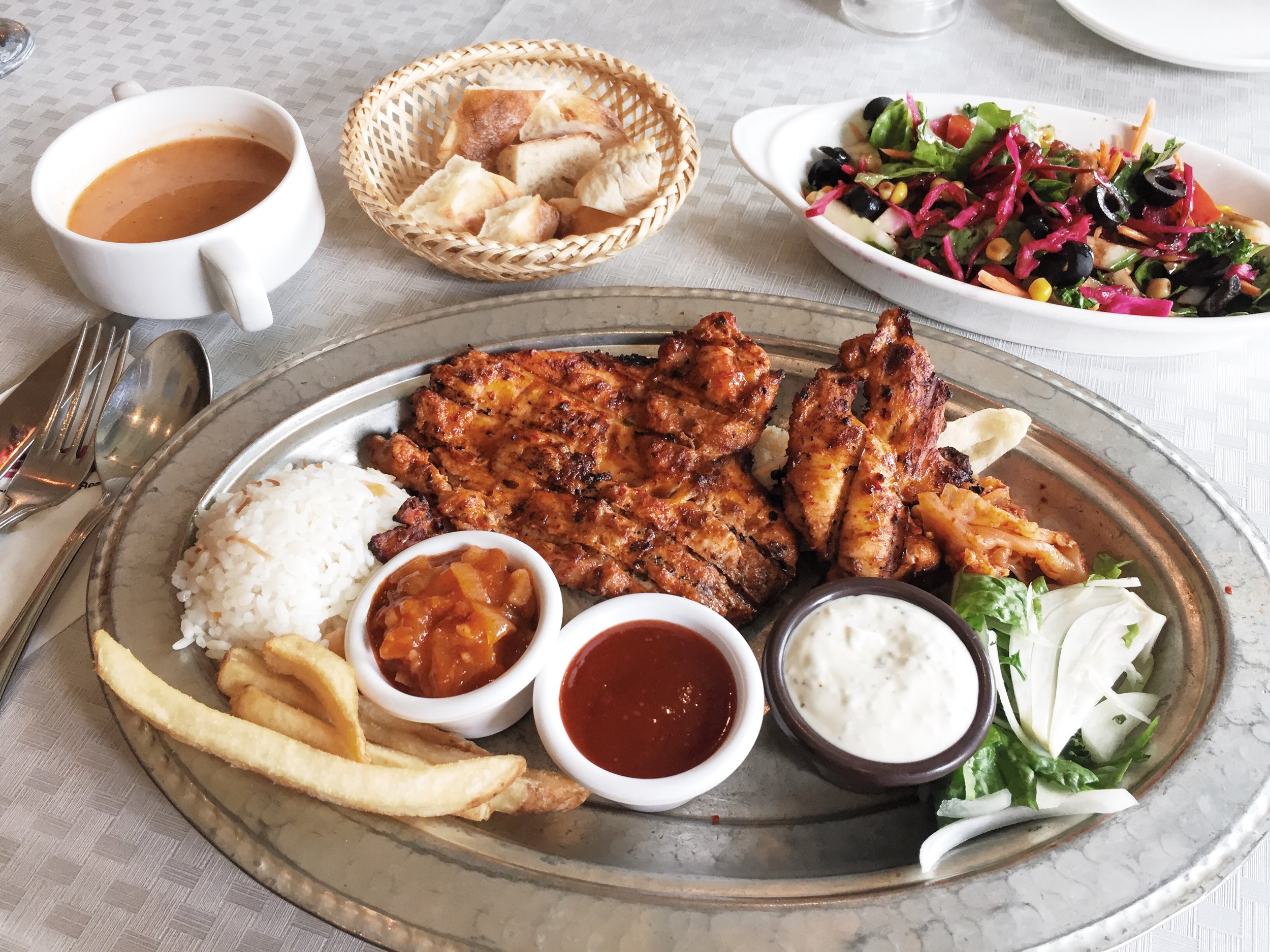FEATURED PHRASES:
*the following phrases are formal
________ 어디 있어요?
________ uhdi issuhyo?
Where is the ________?
Fill in the blank with a place/noun. For example.
호텔 어디 있어요?
Hotel uhdi issuhyo?
Where is the hotel?
그랜드 하얏트 어디 있어요?
Geuraendeu hayatteu uhdi issuhyo.
Where is the Grand Hyatt?
찜질방 어디 있어요?
Jjimjilbang uhdi issuhyo?
Where is the Korean sauna?
화장실 어디 있어요?
Hwajangshil uhdi issuhyo?
Where is the bathroom?
수영장 어디 있어요?
Sooyongjang uhdi issuhyo?
Where is the swimming pool?
식당 어디 있어요?
Shikdang uhdi issuhyo?
Where is the restaurant?
주차장 어디 있어요?
Juchajang uhdi issuhyo?
Where is the parking lot?
빈 방 있어요?
Bin bang issuhyo?
Do you have a vacancy?
싱글룸 있어요?
Shinggeulloom issuhyo?
Do you have a single room?
더블룸 있어요?
Duhbeulloom issuhyo?
Do you have a double room?
스위트룸 있어요?
Seuwiteuloom issuhyo?
Do you have a suite?
금연룸 있어요?
Geumyeonloom issuhyo?
Do you have a non-smoking room?
_______ 있어요?
_______ issuhyo?
Do you have _______?
(Also: Do you have _______?)
Fill the blank in with a noun. You can use this phrase with nouns other than hotel rooms.
소주 있어요?
Soju issuhyo?
Do you have soju?
남자친구 있어요?
Namjachingoo issuhyo?
Do you have a boyfriend?
여자친구 있어요?
Yuhjachingoo issuhyo?
Do you have a girlfriend?
_______ 얼마예요?
_______ uhlmayeyo?
How much is it _______?
하루에 얼마예요?
Haruae ulmayeyo?
How much is it per night?
일주일에 얼마예요?
Eeljuilae ulmayeyo?
How much is it per week?
한달에 얼마예요?
Handalae ulmayeyo?
How much is it per month?
일인당에 얼마예요?
Eelindang ulmayeyo?
How much is it per person?
체크인 시간 언제예요?
Chekeuin shigan eonjeyeyo?
What time is check-in?
체크아웃 시간 언제예요?
Chekeuaoot shigan eonjeyeyo?
What time is check-out?
가방 맡길 수 있어요?
Gabang matgil soo issuhyo?
Can you look after my bags?
와이파이 비밀번호가 뭐예요?
Waeepaee bemilbeonhoga mwoyeyo?
What’s the wifi password?
룸서비스 있어요?
Loomsuhbiseu issuhyo?
Is there room service?
세탁서비스 있어요?
Saetaksuhbiseu issuhyo?
Is there laundry service?
아침식사 포함된 거예요?
Acheemshiksa pohamdwen guhyeyo?
Is breakfast included?
아침식사 몇 시예요?
Acheemshiksa myut shiyeyo?
What time is breakfast served?
1박 추가해도 될까요?
Eelbak chugahaedo dwaelggayo?
May I add one night?
2박 추가해도 될까요?
Ebak chugahaedo dwaelggayo?
May I add two nights?
3박 추가해도 될까요?
Sambak chugahaedo dwaelggayo?
May I add three nights?
_______ 추가해도 될까요?
_______ chugahaedo dwaelggayo?
May I add _______?
Fill in the blank with these number of days:
1 night / 1박 (일박) / eelbak
2 nights / 2박 (이박) / ebak
3 nights / 3박 (삼박) / sambak
4 nights / 4박 (사박) / sabak
5 nights / 5박 (오박) / obak
6 nights / 6박 (육박) / yukbak
7 nights / 7박 (칠박) / chilbak
8 nights / 8박 (팔박) / palbak
9 nights / 9박 (구박) / goobak
10 nights / 10박 (십박) / shipbak
일곱시에 깨워주실 수 있어요?
Eelgopshiae ggaewojushil soo issuhyo?
Can you wake me up at 7 o’clock?
여덟시에 깨워주실 수 있어요?
Yuhduhlshiae ggaewojushil soo issuhyo?
Can you wake me up at 8 o’clock?
아홉시에 깨워주실 수 있어요?
Ahopshiae ggaewojushil soo issuhyo?
Can you wake me up at 9 o’clock?
_______ 에 깨워주실 수 있어요?
_______ ae ggaewojushil soo issuhyo?
Can you wake me up at ______?
Fill in the blank with a time.
공항가는 버스 있어요?
Gonghangganeun buhseu issuhyo?
Is there a bus that goes to the airport?
택시 불러주실 수 있어요?
Taekshi boolluhjushil soo issuhyo?
Can you call a taxi?
공항까지 얼마나 걸려요?
Gonghangkkaji ulmana geollyuhyo?
How long will it take to get to the airport?


































